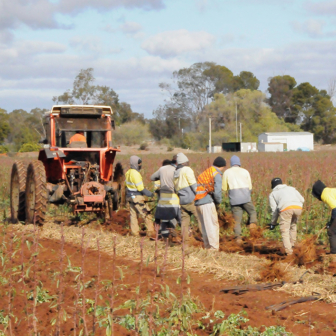I have a friend, a community nurse and midwife, who works in local government. Over dinner one night in 2013 she voiced her distress that public health staff in her unit had been instructed not to give free vaccinations to the babies of migrant workers on 457 visas, international students and other temporary visa holders. They were instructed to tell these parents that they should take their baby or child to a general practitioner for immunisation. While international students and 457 visa holders are required to take out private health insurance that may refund the cost of vaccinations (at least up to the level of the standard Medicare rebate), my friend was concerned that this restriction may result in immunisations being postponed or missed.
When I checked with the relevant authorities, I found that the boss who had given the instruction not to provide free immunisation was indeed implementing official policy. The Australian government’s program of free childhood vaccinations against a wide range of communicable diseases is restricted to citizens, permanent residents, and other people eligible to hold a Medicare card.
In early 2016, over another dinner, my midwife friend told me happily that policy at her workplace had been revised and that all children under ten were now to receive free vaccines, regardless of their visa status. A visit to the Victorian Health Department website confirmed the change. When I’d checked in 2013, the Victorian guidelines stated that you needed to be eligible for a Medicare card to get your children immunised for free, whereas in 2016, the Victorian rules were that all children under ten “can receive the National Immunisation Program vaccines.”
At the federal level, though, the policy had not changed. When I called the federal government’s Immunise Australia Information Line, the helpful young man who took my call assured me the rules were the same as when I originally inquired in 2013. Reading from a written document, he told me that you had to be “eligible to receive Medicare benefits” in order to get free vaccines, which means that the children of most 457 visa holders and international students miss out. So Victorian health authorities say one thing and federal health officials apply another. What is going on here? The answer, it appears, is that the Victorians are pushing definitional boundaries.
In 2015, the federal government was so concerned at the growing gaps in comprehensive childhood immunisation in Australia that it put in place a “no jab, no pay” policy, which means that parents who fail to fully immunise their children are no longer eligible for family assistance payments, including the childcare benefit, the childcare rebate and the family tax benefit part A. This stick was accompanied by a carrot: to encourage parents to fully immunise their children, the federal government introduced a “catch up” program for all states and territories to distribute “free National Immunisation Program vaccines for all children under the age of ten that require catch-up.”
In the Victorian government’s interpretation, any child under ten, including a newborn, who is not fully immunised requires “catch up,” regardless of their parents’ visa status. In short, Victoria has used the catch up program to extend the federal government’s free immunisation program to the children of all temporary visa holders.
The ingenuity of state public servants is admirable. In the field of immunisation, even a small percentage increase in population coverage produces very significant gains for public health. It is difficult to work out whether other states and territories are following Victoria’s lead or sticking to a narrower interpretation of the federal government’s rules because public resources like health department websites offer little, if any, detail on eligibility for vaccines by visa status.
But even if other states and territories do adopt Victoria’s more liberal interpretation of federal rules for under-tens, the teenage children of temporary visa holders are still ineligible for free vaccinations rolled out through schools. The overall result is a mess of different policies and approaches across the nation – hardly an ideal situation in a crucial area of public health policy.
According to the National Centre for Immunisation Research and Surveillance, migrants and culturally and linguistically diverse communities are among the “special-risk and under-served populations” for immunisation. The National Health Performance Authority says tracking the percentage of children who are fully immunised is more difficult in areas with large immigrant populations.
While immunisation providers are expected to have a comprehensive understanding of the eligibility rules for access to free or subsidised vaccines, the Centre for Research Excellence in Population Health warns that “differences in eligibility by vaccine and visa class add complexity and act as a barrier to the provision of catch-up immunisation” in communities that are ‘particularly vulnerable to under-immunisation.” Excluding a proportion of that migration population from free mass immunisation schemes on the basis of their visa status serves to further complicate an already complex situation.
Like many other administrative and legal systems, immunisation programs have failed to keep pace with the shift from permanent to temporary migration. Policy and practice neglect the growing cohort of people who are not quite Australian, because of a flawed assumption that people are either citizens or permanent residents. This oversight could come at significant cost. As one public health official put it to me privately, “I don’t know too many infectious diseases that distinguish between who is a Medicare holder and who is not.” •
This is an edited extract from Not Quite Australian: How Temporary Migration is Changing the Nation, published this week by Text. Inside Story readers can order a copy for 15 per cent off using the promotion code MARES15.




